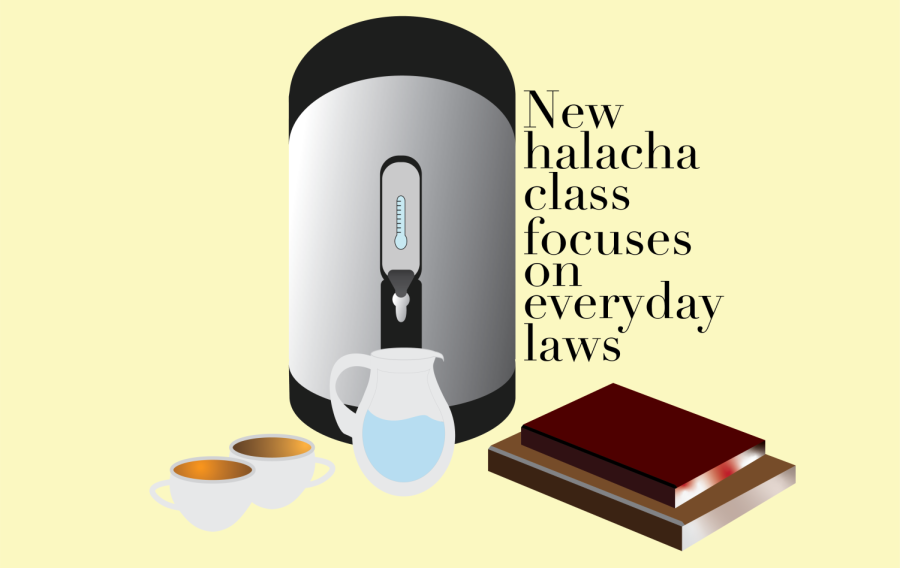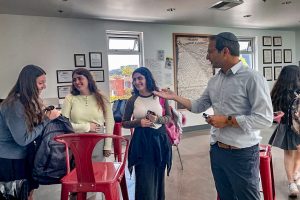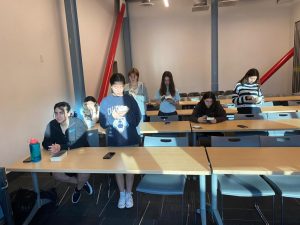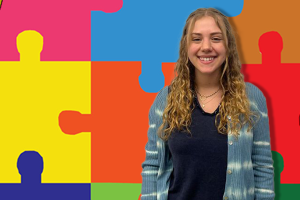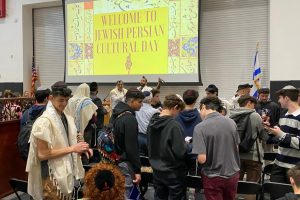Ninth grade studies how to bring holiness to the ordinary
From when to say the Shema to how to serve hot water on Shabbat, freshmen learn the basics
NEW: The ninth grade class in Jewish law is taught by Dean of Students Rabbi Ari Schwarzberg.
June 17, 2022
Shalhevet’s Judaic Studies Department has created a mandatory halacha class for the ninth grade this year to introduce freshmen to Jewish law, instead of teaching it only as it comes up in other Judaic Studies classes.
Dean of Students Rabbi Ari Schwarzberg teaches two halacha, or Jewish law, classes per week, which meet on different days during the I block periods.
“The idea is not to have like big discussions or study different texts, but it is actually to ensure that ninth-graders at our school have developed a good and broad sense of halacha,” said Rabbi Schwarzberg.
He said the class teaches students about laws that they had not known before, as well as details about practices they have maintained all their lives. There are 613 commandments, so officials decided the new course should spread awareness about halachot that are followed regularly around the school.
There’s no homework, but students do work on the halachot at home. Sophomore Jason Askari said he learned he’d been doing some things incorrectly.
“For example on Shabbat,” Jason said. “I am just learning now that I can’t move my phone across my room if had it on my bed. I have to do it in a special way. Like small minor details that I do on a everyday basis.”
Among the topics are hilchos Shabbos, the laws of the Sabbath; hilchot kriyat Shema, the laws of reciting Shema; and hilchot tefillah, the laws of davening.
Judaic Studies director Rabbi David Stein said it was part of “improving, increasing, expanding our Torah learning.”
“We wanted to actually make sure to prioritize and offer options for our students to be learning halacha as well,” said Rabbi Stein.
The new class is meant to just teach Jewish law, not to debate concepts or discuss. Ninth graders, according to Rabbi Schwarzberg, really appreciate a class that is “black and white.”
Yet he said halacha as a separate class was unusual among Jewish high schools.
“In general, if you look at a number of high schools across the country, you’ll see that there’s the classic Gemara [class] periods, Tanach periods, Jewish History periods,” Rabbi Schwarzberg said, “and not a lot of schools teach halacha.”
The class also covers differences between Ashkenazic and Sepharidic laws. And it uses Kahoots to figure out what students already know and understand about Jewish law.
Additionally, passages of halacha are taken out from the Kitzur Shulchan Aruch [abridged Shulchan Aruch] for students to read and understand. Word lists are provided to build up a vocabulary of halachic terms.
There are quizzes about every three weeks, and an optional final has been offered to students who want to raise their grades.
When he can, Rabbi Schwarzberg also uses visual examples. Freshman Mikayla Namvar said that was a good way to remember the laws.
“Last class we were learning like how to make tea on Shabbat, and he brought a kettle and urn,” Mikayla said, to teach us and so we can visualize it and see how it actually do it instead of writing it down, it made it so much easier for us to actually understand and learn.”
Jason Askari said students are being provided with the skills to learn, find and apply Jewish law for themselves.
“Rabbi Schwarzberg teaches us a lot about everything we need to know on a daily basis,” Jason said.
Rabbi Schwarzberg said that was the goal.
“I’ve realized that students actually want to know this and it’s great,” he said. “The more informed Jew you are, the more enriching Judaism will be.
“The goal of the class is that students come out of ninth grade with a better and broader understanding of halacha that allows them… to live a more halachic lifestyle.”
Rabbi Schwarzberg said this is the only ninth grade class he teaches. It is very different to teaching other grades and forces him “to think about teaching and how to be an effective teacher,” he said.
He said some of the material is new to him as well, and that he studies it himself so he can try to teach the material effectively.
Before the pandemic, an optional halacha class was available for 11th and 12th grades. That class has been discontinued for now.
The new freshman course has not replaced any other classes, because the removal of the Fire-Hawk alternate-week scheduling system opened up a free period, which previously had alternated between arts classes and PE. When the schedule became the same every week, the period was given to the halacha class instead, and arts and PE now meet once per week always instead of twice per week sometimes.
Students say that the new class is effective and enjoyable.
“I don’t memorize the material anymore,” said Mikayla. “Like now I know it, and it sticks with me because I am not just being forced to learn everything, and it’s so much more enjoyable.”
According to Rabbi Stein, the course has been one of the “successes that we have had with our schedule this year in terms of introducing a new course.”
“There is definitely a possibility that we would think about expanding the halacha program to additional grades,” said Rabbi Stein.

